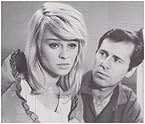Following instructions transmitted from the Andromeda Galaxy, John Fleming (Peter Halliday) builds a highly advanced computer that in turn creates synthetic lifeforms, including Andromeda (Julie Christie) a beautiful clone of Christine, a recently deceased scientist (also played by Christie). The computer and the clone are embraced by the government when they prove themselves capable of advancing Britain's military capabilities to the global forefront while Fleming begins to fear that the alien machine and its gynoid have ulterior motives. Sadly, most of this early BBC science fiction teleplay has been lost, leaving only stills (which encompass much of the series) and episode six of the original seven. The story, written in part by astrophysicist Fred Hoyle, is intriguing, especially considering that radioed instructions from Andromeda would take a minimum of 2.5 million years to get here, suggesting that if aliens are planning on colonising Earth, they are playing a very, very long game. Julie Christie is quite good in the titular role, but Halliday is less impressive and the scenes where he is trying to 'awaken the woman' in the passionless blonde simulacrum are weak (but foreshadow Captain Kirk's numerous attempts to elicit similar emotional epiphanies in Star Trek (1966)). The initial premise and first episodes are great, but the story drifts into a routine industrial espionage yarn and the final act is a bit predictable (although perhaps less so back in 1961). Although not as good (IMO) as the BBC's previous sci-fi teleplays (the three excellent Quatermass series), 'A for Andromeda' was sufficiently popular to warrant a sequel ('The Andromeda Breakthrough' (1962)). Unfortunately the BBC had neglected to put Christie under contract and, as the star was filming her breakthrough role on 'Billy Liar' (1963), she was no longer available for low-budget sci-fi shows to be shown on the telly. The version I recently watched on-line was a well-done ~150 minute annotated compilation of producer Michael Haye's 'telesnaps', some video fragments, and the intact sixth chapter. Worth watching for genre aficionados as well as anyone interested in the history of the BBC or British sci-fi in general.













